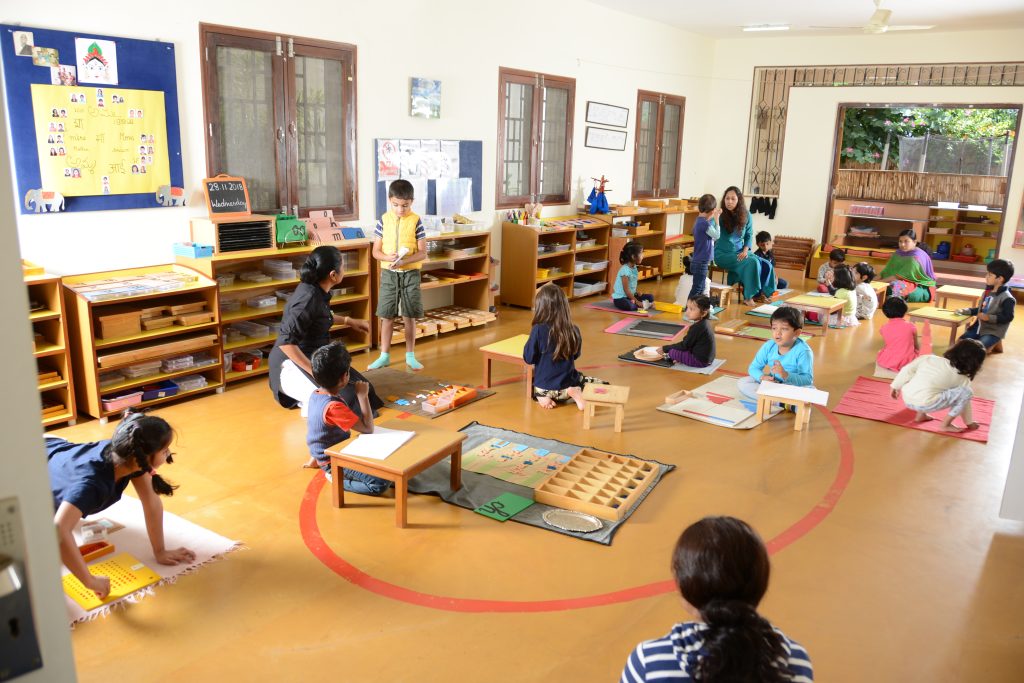The word ’personality’ does not clearly define what we want to say about the child creating himself totally. Yet for want of a better word we are using it. From the time of conception the child is trying to create himself initially physically and later psychically. But it is a unity of both that we may term as ‘personality’. It is the coordinated and cooperative work that makes the total person. It is the confluence of both. We shall try to understand it by means of certain activities of the child
Many persons in the field of Child development including Dr. Montessori have expressed the opinion that the basic personality is laid in the very early years. In later years, certain modifications are possible. But we can see that a person’s real personality is not seen in his social life. So it becomes difficult to judge.
Personality is laid on the basis of the structure of the physical development and, more so, on the mental development. It , most definitely ,cannot be reckoned separately because the personality is the fusion of the body and the mind. Here the mind is to be understood as the sum total of all psychical powers.
It is the ingenuity of Dr Montessori to classify the early years of man before and after birth jointly as the entire period of embryonic development. In order to distinguish, she wants to name them as the periods of physical embryonic development and psychical embryonic development. The fusion happens around the time the child is two years of age.
When we were doing the course we asked Mr. A.M.Joosten ( a stalwart in the Montessori world ad an associate of Dr. Montessori) how is it that the children of the same parents have different personalities. They have same parents, same household, same grandparents etc . Mr. Joosten laughed aloud and asked “Is that so?” We said “yes’ very affirmatively.
He said” The first child comes into an environment of two adults. The second child comes into an environment of two adults and a child. No two children have the same environment. No wonder their personalities are different.”
Even as we remark about the individual child making his character Dr. Montessori points out certain manifestations of child character. Though, generally, we say many things about child nature, these seem contradictory to the beliefs that float in our society. Not only did Dr. Montessori witness them, but her followers to this day see them in children in the specially prepared environments.
Detailed recorded notes of observation of children in specially created environments for children reveal these activities of children. In a few weeks of life in an environment that equipped for continuous activity of the child it seen that the child immerses himself in certain activity that he can totally ignore the surroundings. What else is this if we do not call it concentration? Because the environment is created for the child to act, nobody disturbs. So the ‘concentration’ can be seen for a length of time. When people complain that the child flits like a butterfly and cannot work at length they must realise that the environment is not specially made for them.
It s commonly found that the child repeats the same activity several times before he comes to that state of concentration.” Repeat until you master it” seems to be the maxim of child’s life. But we adults cannot tolerate it. We get tired of the repetition of the child. Have not seen children filling sand in their pail while on the seashore? But we are annoyed when we see the child topple the pail and start filling it again? Some even term it as madness. But the child is not tired of repeating. But the matter of wonder is that he stops at some unexpected moment. Again wonder. Why did he stop? His inner soul judges that he has gained certain mastery and, therefore, there is no need to repeat.
The child is capable of making choices. This is possible only if he is given the opportunity. But Dr. Montessori says that the fact that he chooses a task does not that was the right one for his development. He may discard it and choose another. It is often seen that the child chooses something that gives him a challenge. What a contrast to adults who will always want the easy task!
This is easily noticed but always discouraged by the adults! Children seek challenges. Have not seen children climbing on the sliding part of the chute in the garden? As we walk on the pavement beside the road the child tries to walk on the curb. We see children opting to climb the stairs backwards. Older children find thrill in saying the sounds in a word backwards. After such hard work they feel rested not tired. Such examples are plenty. If we really observe them truthfully we find that children like to throw challenges in their life.
“ Life is mysterious. A teacher would never be respected for saying “I will give this child this or that piece of work to give him energy” But this is the only way to reach him. Only the voice of life can choose the work that the child truly needs. Therefore it is enough that the teacher respects this mysterious process and knows to wait with faith”
Dr. Maria Montessori says in “The child in the family”
Even as we feel that these discoveries as things unbelievable we must recognise them as true and give the child his due rights. Only those who have been able to keep an open mind and observe will be able to witness these truths.
A very interesting comparison is made by Dr.Montessori. Being an European herself she takes this example. All Europeans are interested in knitting. Dr. Montessori asks what would if someone knitted on after having dropped a stitch. The garment will be made but it would have developed a hole- a weak point. That is what happens while the child goes on making himself. If a necessary ingredient is not available there is a void. That ‘dropped stitch” is the weakness in the personality.
With such incessant hard work does the child build himself. But let us ensure we are not the cause of dropped stitches






Comments are closed.